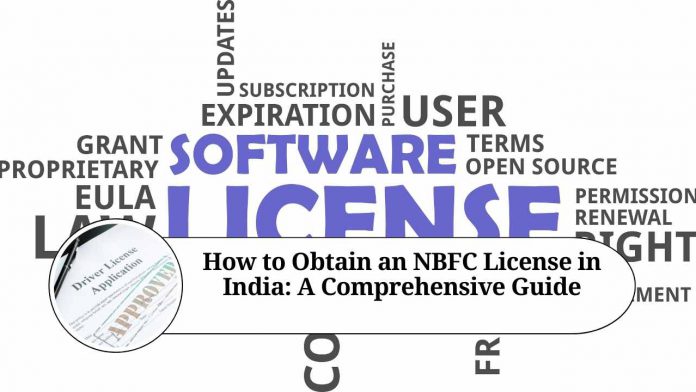NBFC License: A Guide to Obtaining It
Non-Banking Financial Companies (NBFCs) have been gaining traction in the financial sector due to their ability to offer a wide range of financial products and services. However, starting an NBFC requires obtaining an NBFC license from the Reserve Bank of India (RBI). In this blog, we will discuss the process of obtaining an NBFC license in India, including the eligibility criteria, documents required, and the application process.
What is an NBFC License?
An NBFC license is a permit issued by the RBI to a company to conduct financial activities similar to a bank, such as lending, investing, borrowing, or accepting deposits, but without having a banking license. NBFCs are different from banks in the sense that they cannot issue checks or demand drafts, and they are not part of the payment and settlement system.
Eligibility Criteria for Obtaining an NBFC License
Before applying for an NBFC license, it is important to ensure that the company meets the following eligibility criteria:
- The company must be registered under the Companies Act, 2013, or any other relevant law.
- The company must have a minimum net owned funds of Rs. 2 crores.
- The company must have a board of directors with at least one director having at least ten years of experience in the banking or financial sector.
- The company must have a good track record of compliance with regulatory requirements.
Documents Required for Obtaining an NBFC License
The following documents are required to obtain an NBFC license:
- Certificate of Incorporation
- Memorandum and Articles of Association
- Board Resolution approving the application for an NBFC license
- A detailed business plan, including the proposed activities of the NBFC
- A declaration from the directors of the company regarding their fitness and propriety
- KYC documents of the directors and shareholders
- Audited financial statements of the company for the last three years
- Income Tax Returns of the directors and shareholders for the last three years
Application Process for Obtaining an NBFC License
The application process for obtaining an NBFC license involves the following steps:
- Register on the RBI website and obtain an Application Reference Number (ARN).
- Fill out the online application form and submit it along with the required documents.
- The RBI will review the application and may seek additional information or documents.
- The RBI may also conduct an inspection of the company’s registered office or place of business.
- If the application is approved, the RBI will issue an NBFC license, and the company can start its operations.
The RBI offers three types of NBFC licenses based on the activities that the company intends to undertake. These are:
- Asset Finance Company (AFC) – This type of NBFC is engaged in the financing of physical assets such as machinery, vehicles, and equipment.
- Investment Company (IC) – This type of NBFC is involved in the acquisition of securities and investments in the financial sector.
- Loan Company (LC) – This type of NBFC is engaged in providing loans and advances, such as personal loans, business loans, and loans against securities.
The eligibility criteria and the application process for each of these categories are the same as that for an NBFC license. However, the company’s business plan must indicate the specific activities that it intends to undertake.
Benefits of Obtaining an NBFC License
There are several benefits of obtaining an NBFC license, including:
- Flexibility – NBFCs are not subject to the same regulations as banks, and therefore, they have greater flexibility in terms of their business operations.
- Diversification of Financial Products and Services – NBFCs can offer a wide range of financial products and services to their customers, such as loans, investments, and insurance.
- Less Capital Requirement – The minimum capital requirement for an NBFC is lower than that for a bank, making it easier for small businesses to obtain an NBFC license.
- Better Access to Funding – NBFCs can raise funds through various sources, such as deposits, bonds, and commercial papers, which enables them to expand their operations.
Conclusion
Obtaining an NBFC license is a complex process, but it offers several benefits to companies that want to operate in the financial sector in India. By meeting the eligibility criteria, submitting the required documents, and completing the application process, companies can obtain an NBFC license and offer a wide range of financial products and services to their customers.
Read more useful content:
Frequently Asked Questions (FAQs)
- What is an NBFC License, and why is it important?
An NBFC license is a permit issued by the RBI that allows a company to conduct financial activities similar to a bank, such as lending, investing, and borrowing, without having a banking license. It is essential for companies that want to operate in the financial sector in India.
- What is the minimum net owned funds required for obtaining an NBFC License?
The company must have a minimum net owned funds of Rs. 2 crores to be eligible for an NBFC License.
- What are the eligibility criteria for obtaining an NBFC License?
The company must be registered under the Companies Act, 2013, or any other relevant law. The company must have a minimum net owned funds of Rs. 2 crores. The company must have a board of directors with at least one director having at least ten years of experience in the banking or financial sector. The company must have a good track record of compliance with regulatory requirements.
- What documents are required for obtaining an NBFC License?
The required documents include the Certificate of Incorporation, Memorandum and Articles of Association, Board Resolution approving the application for an NBFC license, a detailed business plan, a declaration from the directors of the company regarding their fitness and propriety, KYC documents of the directors and shareholders, audited financial statements of the company for the last three years, and income tax returns of the directors and shareholders for the last three years.
- What are the different types of NBFC licenses?
The RBI offers three types of NBFC licenses based on the activities that the company intends to undertake. These are Asset Finance Company (AFC), Investment Company (IC), and Loan Company (LC).
- What is the application process for obtaining an NBFC License?
The application process involves registering on the RBI website, filling out the online application form, submitting the required documents, and undergoing an inspection of the company’s registered office or place of business.
- What are the benefits of obtaining an NBFC License?
The benefits of obtaining an NBFC License include flexibility in business operations, the ability to offer a wide range of financial products and services, lower capital requirements than banks, and better access to funding.
- Is it mandatory to obtain an NBFC License to operate in the financial sector in India?
Yes, it is mandatory to obtain an NBFC License to operate in the financial sector in India.
- Can an NBFC convert to a bank?
Yes, an NBFC can convert to a bank subject to fulfilling the eligibility criteria and obtaining the necessary approvals from the RBI.
- Can an NBFC operate outside India with an NBFC License?
No, an NBFC License issued by the RBI is valid only for operations within India. An NBFC must obtain a separate license to operate outside India.




















